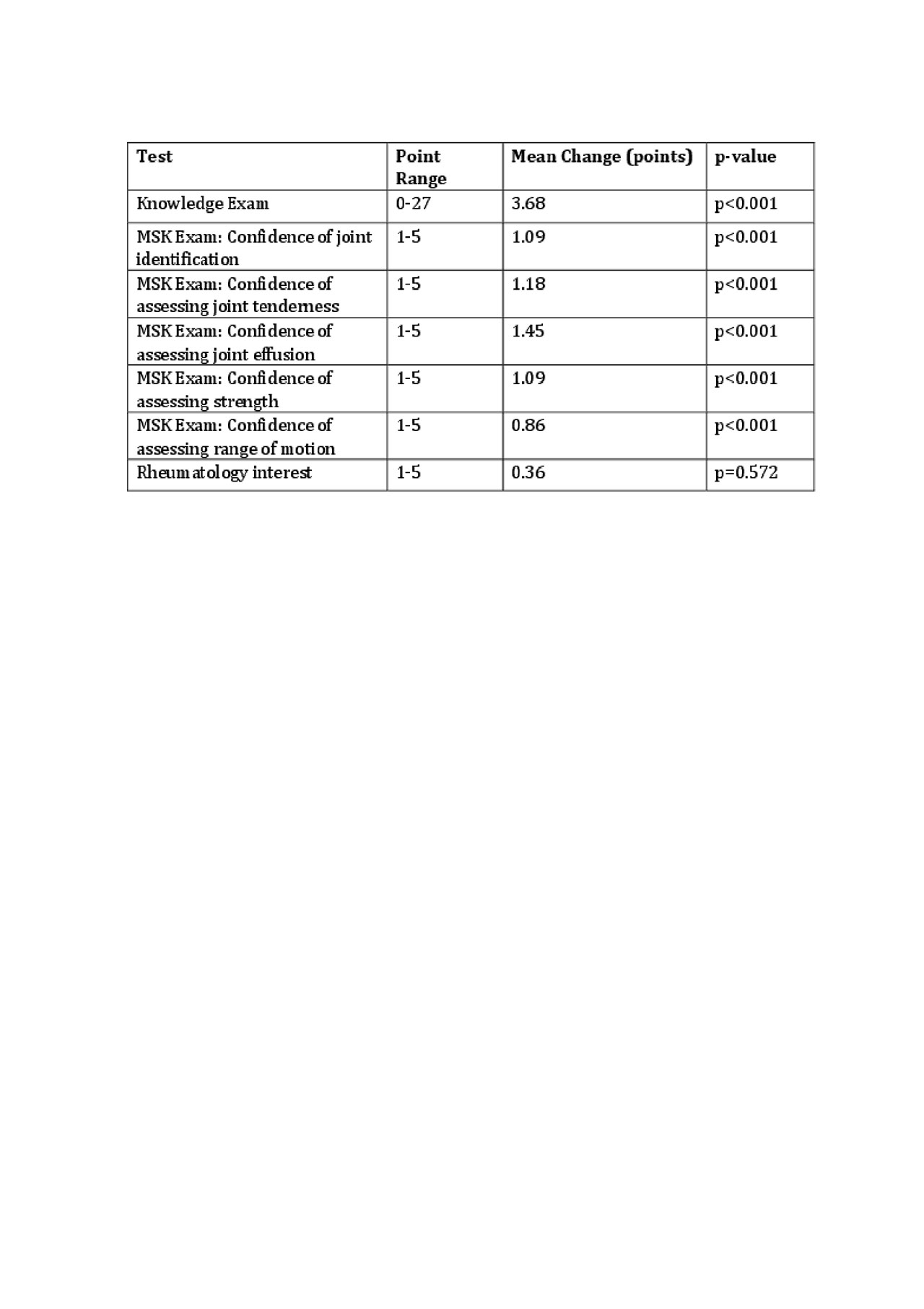Session Information
Date: Sunday, November 10, 2019
Title: Education Poster
Session Type: Poster Session (Sunday)
Session Time: 9:00AM-11:00AM
Background/Purpose: Musculoskeletal (MSK) disorders are one of the most common clinic visit complaints. Prior studies evaluating graduate medical training of rheumatology and MSK medicine have shown that a knowledge gap exists in the United States. This gap in knowledge could lead to a delay in medical care and increased healthcare costs. In an attempt to bridge this gap, we designed an introductory curriculum for PGY-1 internal medicine (IM) residents during their first months of residency, aimed at improving knowledge of MSK and rheumatologic conditions, as well as providing early exposure to rheumatology. Our purpose was to assess whether the use of these didactics would: 1) increase rheumatology medical knowledge, 2) result in retention of knowledge, 3) increase confidence of MSK exam skills, and 4) increase rheumatology career interest.
Methods: The study was conducted at Hennepin Healthcare. PGY-1 residents are required to participate in an immersion ambulatory rotation during one of their first three months of residency. We developed a curriculum focused on introductory rheumatology concepts, MSK medicine, and MSK exam that were integrated into their immersion month. We evaluated PGY-1 IM resident knowledge on three separate occasions via a voluntary online test: pre-intervention, post-intervention, and 1-3 months after completing their immersion block (retention test). The test included 27 questions on rheumatology and MSK knowledge, 5 questions on confidence in MSK exam, and one question regarding interest in rheumatology. PGY-2 residents were enrolled as the voluntary comparison control group and completed an identical test to the PGY-1 resident retention test. We provided small gift cards as compensation to increase voluntary participation. Data was collected and stored on a secure cloud-based program, then analyzed using the student’s t-test.
Results: All 22 PGY-1 residents completed the pre- and post-test. Approximately 64% of PGY-1 residents and 64% of PGY-2 residents completed the same retention test. The PGY-1 residents who participated in the rheumatology immersion didactics scored significantly higher on both their post-test and confidence in MSK exam scores (p=< 0.001). There was no significant difference between post-test scores and the retention exam score (p=0.435). The PGY-1 residents also scored significantly higher on their retention test compared to the PGY-2 control group (p=0.027). There was no statistical difference in rheumatology interest either before or after intervention in PGY-1 group or between PGY-1 and PGY-2 groups.
Conclusion: Our pilot study suggests that integrating rheumatology didactics early in residency results in immediate and long-term improvement in rheumatology knowledge and confidence in the MSK exam. The present deficit in rheumatology and MSK medical knowledge, combined with the growing frequency of these conditions in the primary care setting, highlights the importance finding methods to address this gap in knowledge. Our study demonstrates early education in rheumatology and MSK knowledge provides a possible cost-effective solution.
To cite this abstract in AMA style:
Miller E, Ngo L, Abou Zahr Z, Mahrer C, Nasr R. A Prospective, Unblinded, Non-randomized Pilot Study Examining the Effect of a Musculoskeletal Immersion Curriculum for First Year Internal Medicine Residents [abstract]. Arthritis Rheumatol. 2019; 71 (suppl 10). https://acrabstracts.org/abstract/a-prospective-unblinded-non-randomized-pilot-study-examining-the-effect-of-a-musculoskeletal-immersion-curriculum-for-first-year-internal-medicine-residents/. Accessed .« Back to 2019 ACR/ARP Annual Meeting
ACR Meeting Abstracts - https://acrabstracts.org/abstract/a-prospective-unblinded-non-randomized-pilot-study-examining-the-effect-of-a-musculoskeletal-immersion-curriculum-for-first-year-internal-medicine-residents/


